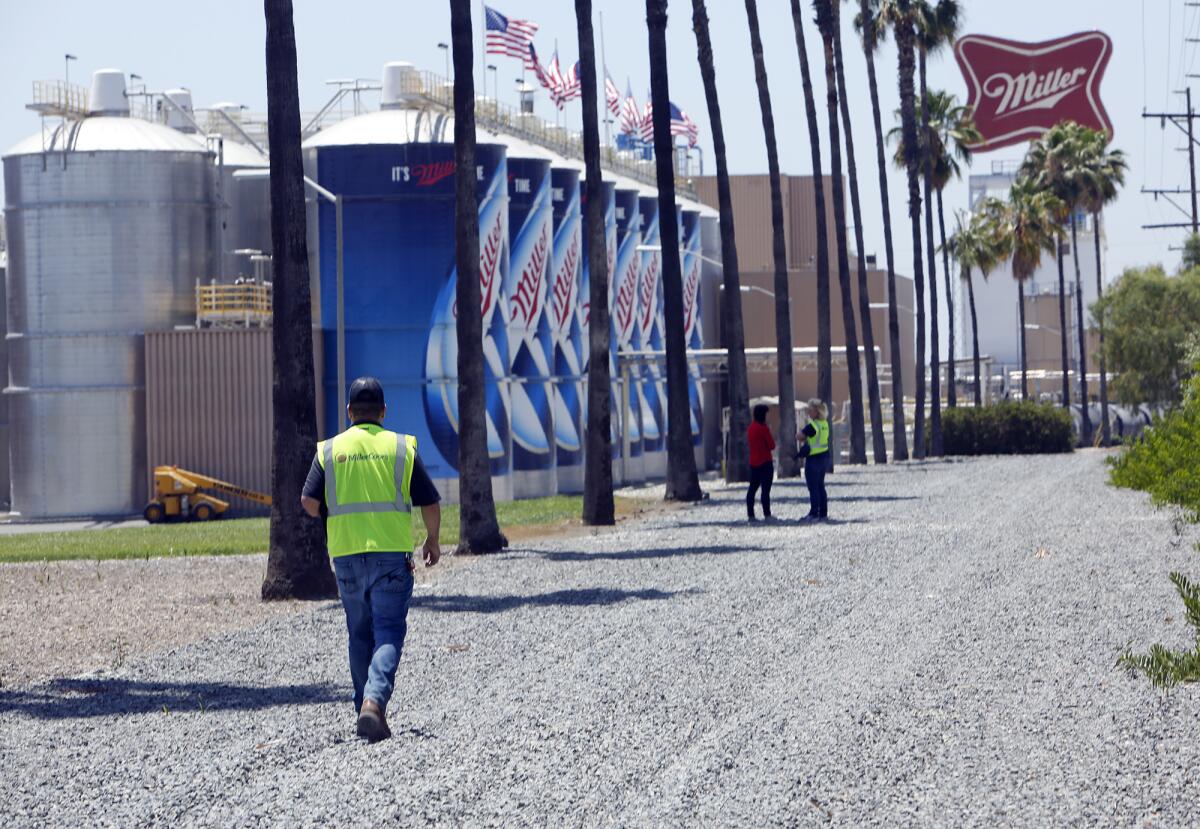Beer-brewing giants prime for mega-deal

The MillerCoors brewery in Irwindale on June 16, 2014.
- Share via
As the U.S. beer market gets more crowded, major brewing powerhouses may be looking globally to turn a profit.
Anheuser-Busch InBev said Wednesday that it had approached rival SABMiller with a takeover offer, a deal that would combine the world’s two biggest brewers into a global beer behemoth.
Acquisitions have become common in the beer industry as drinkers increasingly opt for brews made by small operations — or that project the aura of artisan beer.
Craft beer continues to outperform the overall U.S. beer market, and now represents 11% of total volume. Over the last five years, craft beer production has grown at an annualized rate of 18.5%, compared with 5.6% for the brewing industry as a whole, according to market research firm IBISWorld.
Major domestic manufacturers are buying other brewers partly out of concern that their revenue and profits might be eroding because of craft brewers, said Nick Petrillo, industry analyst for IBISWorld.
“I don’t look at this deal as something that AB InBev and SABMiller are doing because they’re struggling,” he said. “I sort of see it as it’s an opportunity to maintain profit margins.”
Just last week, Heineken said it would take a 50% stake in Lagunitas Brewing Co., a popular Petaluma, Calif.-based craft brewer with a strong national presence. And MillerCoors said it took a majority stake in San Diego craft brewery Saint Archer, which is known for its ales.
Analysts said the mega-deal would save money and expand the combined company’s geographic reach but wouldn’t address changing consumer tastes.
The craft movement remains a “key disruption force” within the entire alcohol industry, said Spiros Malandrakis, senior analyst of alcoholic drinks at the London-based market intelligence firm Euromonitor International.
Craft brews are especially popular in the U.S. and Britain, and markets such as China and India aren’t far behind, he said.
The interest in craft drinks, along with specialty brews such as flavored beers and “speers,” or hybrids of spirits and beer, is also increasing — a sign that millennials are looking for something different from “big beer,” he said
“An even more gigantic organization is not what consumers are looking for in this age,” Malandrakis said.
AB InBev, which is based in Leuven, Belgium, said that it would work with SABMiller’s board to develop a proposal to take to shareholders of the London-based brewing company.
No terms were mentioned, but SABMiller had a market value of about $75 billion before news of AB InBev’s interest pushed the stock up $9.72, or 20%, to $56.45 a share on Wednesday.
AB InBev makes more than 200 beers, including Budweiser and Stella Artois, and operates in 25 countries. SABMiller makes more than 200 beers, including Miller Genuine Draft and Pilsner Urquell, and has operations in more than 80 countries.
The combined company would have a market capitalization of about $275 billion, revenue of about $81 billion and control nearly a third of the global beer industry.
The overseas market is important for these companies, as the U.S. market had thin profit margins to begin with, Petrillo said. Earlier this week, MillerCoors, a joint venture between SABMiller and Molson Coors Brewing Co., said it would close its Eden, N.C., brewery in September 2016.
MillerCoors Chief Integrated Supply Chain Officer Fernando Palacios said in a statement that the closing would “optimize our brewery footprint” and “streamline operations” at its remaining seven breweries.
“They’re starting to look at North America in general as not exactly a growth area for them,” Petrillo said.
But with the potential combination of these beer giants comes concerns that competition might be reduced, leading to higher prices for consumers.
“I do think the antitrust authorities would investigate this merger more closely,” said Nicola Sharpe, University of Illinois College of Law professor.
SABMiller probably would be required to sell its 58% stake in MillerCoors, Petrillo said. This could set the stage for a new leader in American beer.
Both SABMiller and AB InBev have operations in Southern California. The MillerCoors venture has a brewery in Irwindale, and AB InBev runs a brewery in Van Nuys.
samantha.masunaga@latimes.com
More to Read
Inside the business of entertainment
The Wide Shot brings you news, analysis and insights on everything from streaming wars to production — and what it all means for the future.
You may occasionally receive promotional content from the Los Angeles Times.










